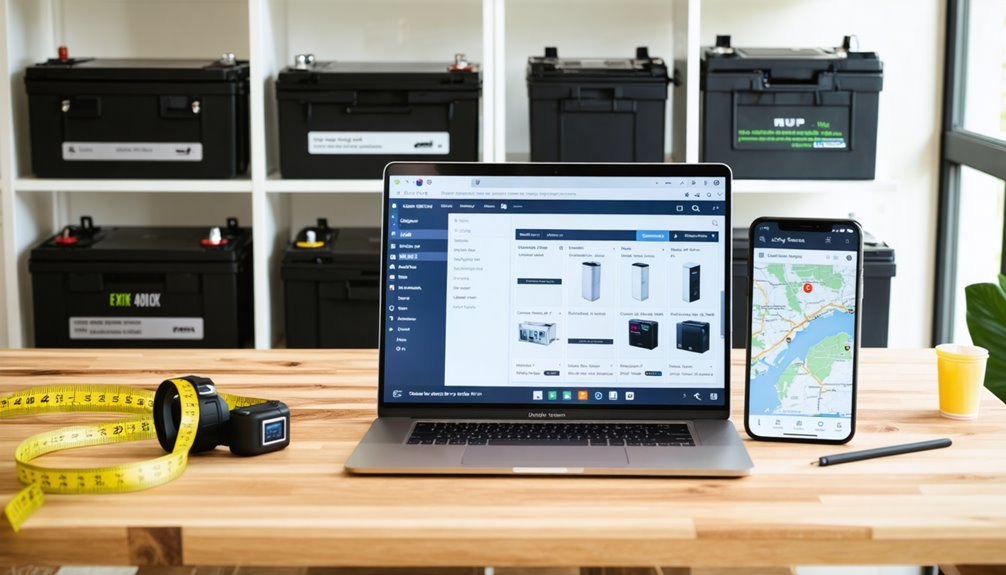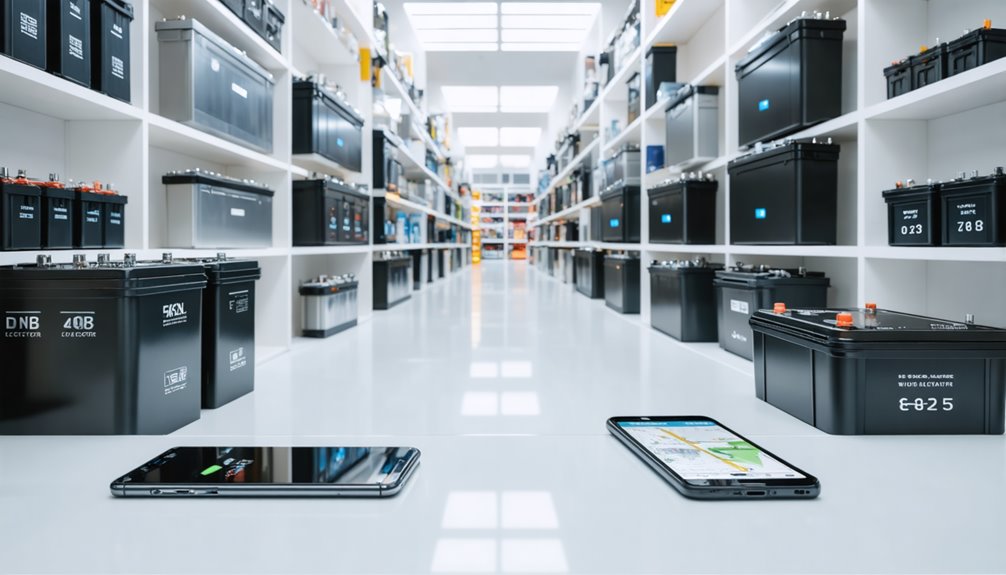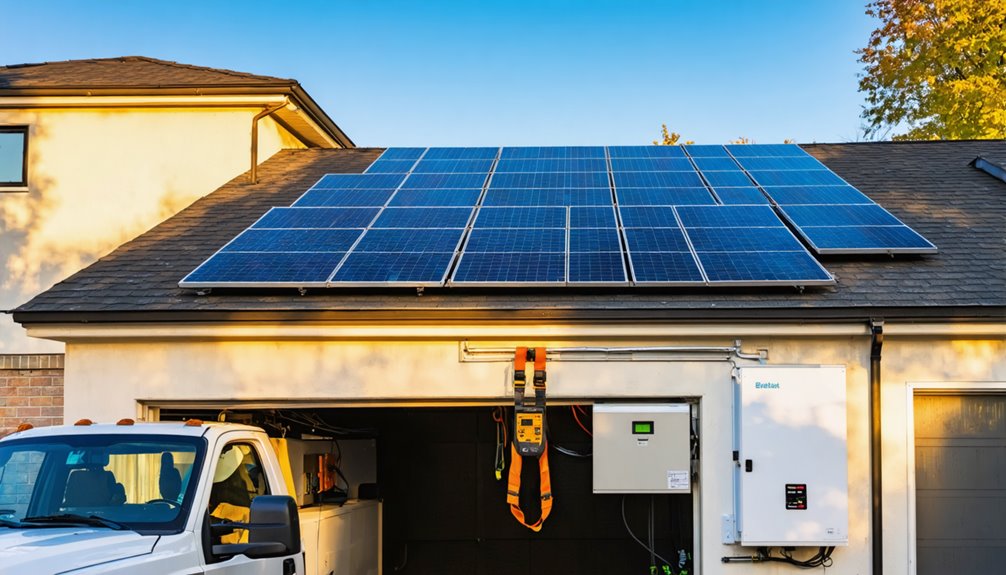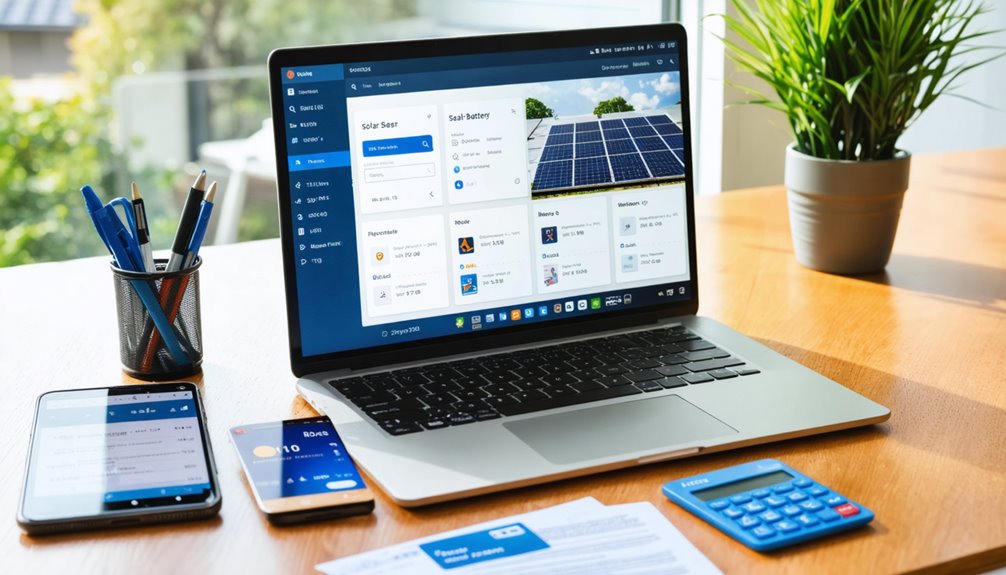You’re searching for solar batteries but don’t know where to start. Major retailers like Amazon and Home Depot sell them online, while local stores offer in-person shopping. Some buyers go straight to manufacturers for better deals. Others prefer specialty energy suppliers for expert guidance. With dozens of brands, various payment options, and installation services available, finding the right battery involves more choices than you’d expect.
Major Online Retailers for Solar Battery Shopping
Where can you find solar batteries online? You’ve got several major retailers to choose from. Best Buy sells solar batteries from brands like Enphase and Fortress Power. You can order them online for shipping or pick them up at a store.
Amazon’s another popular choice. They’ve got lots of solar batteries with customer reviews. You’ll find brands like SimpliPHI and MK Battery there. The reviews help you compare different models.
Home Depot carries solar batteries too. They focus on products that work with different solar panel systems. Their lithium-ion options come at competitive prices.
Lowe’s specializes in solar solutions, including battery storage. They often run promotions and discounts for online orders. Batteries Plus offers expert advice along with their selection, including Duracell and lead-acid types.
Solar Battery Manufacturer Direct Purchase Options
You can buy solar batteries directly from the companies that make them. Major manufacturers like Enphase, Fortress Power, and SimpliPHI sell batteries through their own websites. When you buy straight from the manufacturer, you’ll often get exclusive products, warranty details, and customer support that third-party stores don’t offer. Solar batteries can be a worthwhile investment for homeowners, especially in areas with frequent power outages, as they provide energy independence and cost savings during peak hours.
Direct Manufacturer Benefits
When shopping for solar batteries, buying directly from manufacturers like Enphase or Fortress Power gives access to the newest technology and products that third-party retailers don’t always carry. You’ll often find lower prices since there’s no middleman involved. This means savings on advanced lithium battery options for your energy storage needs.
Direct purchases usually come with better warranties. Many manufacturers offer 10-year guarantees or longer on their battery storage systems. You’re also getting products with better quality control. Manufacturers oversee the entire production process of their solar power batteries and battery management system components.
Some companies provide special deals or payment plans you won’t find in stores. These exclusive offers can make purchasing batteries for your solar power system more affordable.
Leading Brand Options
Three major solar battery brands dominate the direct-purchase market with their lithium-ion technology. You’ll find Enphase, Fortress Power, and SimpliPHI leading the industry with different storage capacities. These manufacturers offer solutions ranging from 5 kWh to 18.5 kWh.
| Brand | Key Feature | Capacity | Warranty |
|---|---|---|---|
| Enphase | Integrated tech | 5-10 kWh | 10 years |
| Fortress Power | Evault Max model | 150 Ah | Standard |
| SimpliPHI | Multiple voltages | Up to 18.5 kWh | Varies |
Fortress Power’s Evault Max costs $7,560 for customers who need larger energy storage. You can choose from 24V, 48V, or 240V systems depending on your home’s needs. These solar batteries work for both off-grid and hybrid setups. Each brand includes warranty support when you buy directly from them.
Local Hardware and Home Improvement Store Options
You’ll find solar batteries at major chains like Home Depot and Lowe’s, which stock brands including Enphase and Fortress Power. Regional hardware stores also carry these products and often have staff who can help you pick the right battery for your system. Many locations offer special promotions and some provide installation services to help set up your energy storage. When choosing solar batteries, consider the depth of discharge ratings as this affects the battery’s performance and lifespan.
Major Chain Store Availability
Several major chain stores now stock solar batteries in their home improvement sections. You’ll find popular brands at Home Depot and Lowe’s, including Enphase and Fortress Power. These stores keep expanding their renewable energy products.
| Store Type | Battery Options | Availability |
|---|---|---|
| Home Depot/Lowe’s | Enphase, Fortress Power | In-store |
| Walmart | Various brands | Automotive/Electronics |
| Ace Hardware | Lead-acid, Lithium-ion | In-store |
Walmart’s supercenters place solar batteries in their automotive or electronics aisles. Ace Hardware locations stock both lead-acid and lithium-ion types for different capacity needs.
Regional chains often offer solar batteries through online platforms or special orders. They’re making it easier for customers to find renewable energy solutions. Many local hardware stores are adding more solar battery inventory as customer interest grows in sustainable power options.
Regional Hardware Store Networks
Anyone looking for solar batteries can find them at regional hardware store networks across the country. Stores like Ace Hardware and True Value stock different types, including lithium-ion and lead-acid models. You’ll get immediate access to these products without waiting for shipping.
Home Depot and Lowe’s carry solar batteries from well-known brands like Enphase and Fortress Power. These stores often have knowledgeable staff who can help you choose the right battery for your energy needs.
You might find competitive prices at regional chains, especially during seasonal sales. Many stores let you order solar batteries online and pick them up at the store. This saves shipping costs and gets you the product faster.
In-Store Expert Consultation Services
Local hardware stores don’t just stock solar batteries they also provide expert help to guide your purchase. You’ll find knowledgeable staff at major chains like Home Depot and Lowe’s who can explain different battery types. They’ll show you lithium-ion and lead-acid options in specialized battery sections.
These stores let you schedule personal consultations. During appointments, experts discuss your energy needs and system compatibility. They’ll share information about the latest solar battery technologies from top brands.
Staff members can explain warranty details and maintenance requirements. They’ll also help you understand which energy storage solutions work best for off-grid or hybrid solar systems. You can ask questions about installation options and learn which solar batteries match your specific requirements.
Specialized Renewable Energy Equipment Suppliers
When you’re looking for solar batteries, specialized renewable energy equipment suppliers offer some of the widest selections available. You’ll find advanced lithium options from brands like Enphase, Fortress Power, and SimpliPHI at these stores. They also provide solutions specifically tailored for off-grid locations to ensure energy availability in isolated areas. These suppliers stock different voltage options, including 24V and 48V lithium-ion batteries. They last longer and work more efficiently than traditional lead-acid batteries. You’ll see capacity measurements in kilowatt-hours for lithium batteries and amp-hours for lead-acid models. This information helps you choose based on your energy needs. Most suppliers offer flexible shipping and in-store pickup. You can expect delivery within 4 to 7 business days after ordering. They typically provide customer support and warranty services too. You’ll get help with fulfillment and maintenance when needed.
Key Solar Battery Brands and Their Availability

Where can you find the best solar battery brands for your home? You’ll discover leading manufacturers at various retailers and online platforms. Enphase’s IQ Battery 5P sells for $4,134 after discounts from its original $5,291 price. It’s known for high efficiency and lightweight design.
Fortress Power’s Evault Max provides 18.5 kWh capacity at $7,560. SimpliPHI’s Lithium Ferro Phosphate Battery costs $1,716 with 57 Ah capacity. Other notable brands include MK Battery and HomeGrid.
These solar batteries feature both lithium-ion and lead-acid technologies. You can purchase them from major retailers or specialized online platforms. Fulfillment centers typically deliver orders within four to seven business days. Each brand offers different capacities and features for various energy storage needs. Solar battery prices can vary greatly based on factors such as battery chemistry and installation complexity, with costs typically ranging from $8,000 to $15,000 for a complete system including installation.
Comparing Lithium-Ion Vs Lead-Acid Battery Options
Battery technology makes a big difference in solar energy storage. You’ll find two main types when shopping: lithium-ion batteries and lead-acid batteries.
Lithium-ion batteries let you use 80% of their stored power, while lead-acid batteries only allow about 50%. You’ll also get more life from lithium-ion options. They’ll last up to 10 times longer and keep 80% of their capacity after 2,000 charging cycles.
Efficiency matters too. Lithium-ion batteries work at 99% efficiency, but lead-acid batteries only reach 75-80%. You won’t need to maintain lithium-ion batteries much either. They’re basically maintenance-free with low self-discharge rates.
Lead-acid batteries need regular checks and upkeep. Lithium-ion batteries also charge faster, so you’ll use your solar energy sooner.
Understanding Solar Battery Pricing and Value
Solar battery prices range from about $1,700 to over $7,500, depending on the size and type you’re looking at. The SimpliPHI 24V costs $1,716, while the Fortress Power Evault Max 18.5 kWh runs $7,560. These price differences reflect varying capacities and technologies.
| Battery Type | Price Range | Lifespan |
|---|---|---|
| Lead-Acid | Lower cost | Shorter |
| Lithium-Ion | Higher cost | 10x longer |
Lithium solar batteries for solar systems cost more upfront but last much longer. They’ll keep 80% capacity after 2,000 cycles. Online shopping can save you money too. The Enphase 5.0kWh IQ Battery 5P has a $1,156 discount right now.
Several factors affect pricing: battery capacity (measured in kWh), depth of discharge, and warranty length. When you’re evaluating value, don’t just look at the purchase price. Energy independence and lower electricity bills can boost your return on investment over time. Additionally, understanding how a proper battery management system optimizes charging cycles can significantly extend the lifespan of your solar battery.
Evaluating Battery Capacity and Power Requirements

Getting the right size battery starts with knowing how much power you use each day. You’ll measure this in kilowatt-hours (kWh). This number helps determine what batteries for solar you’ll need.
Different battery types offer different depths of discharge (DOD). You can use 80% of a lithium-ion battery‘s capacity, but only 50% of a lead-acid battery‘s capacity. This affects how many batteries you’ll need.
Battery lifespan varies too. Lithium-ion batteries last about 2,000 charge cycles while keeping 80% of their original capacity. Temperature also matters. Extreme heat or cold reduces battery efficiency and shortens their life. You’ll find battery capacity measured in kWh for lithium batteries and amp-hours (Ah) for lead-acid types.
When planning your solar battery system, factors like climate and solar panel capacity should also be considered, as they can significantly influence the number of batteries you’ll need.
Warranty Considerations When Purchasing Solar Batteries
When you’re shopping for solar batteries, you’ll find warranties that range from 10 years to specific capacity limits, with lithium-ion models typically offering longer coverage than lead-acid options. You’ll need to check what’s covered, including defects and performance guarantees, plus any restrictions based on how you use the battery. The manufacturer’s reputation also plays a role, as established brands like Enphase and Generac often provide more extensive warranty terms than newer companies.
Warranty Duration Comparison
As you’re comparing different solar battery options, you’ll notice warranty lengths vary considerably between manufacturers. Most solar batteries come with warranties between 5 to 10 years. Here’s how major brands compare:
| Brand | Warranty Duration | Additional Coverage |
|---|---|---|
| Generac | 10 years | 7.56MWh throughput |
| Enphase | 10 years | Standard coverage |
| SimpliPHI | Extended period | Lithium technology |
Lithium-ion batteries typically offer longer warranties than traditional lead-acid options. Companies like Fortress Power back their advanced lithium technology with extended warranties. HomeGrid also provides competitive warranty periods for their lithium products.
The warranty duration often reflects a manufacturer’s confidence in their product. Longer warranties can indicate better expected performance and reliability. When you’re evaluating different batteries, the warranty length becomes an important factor in determining the overall value of your investment.
Coverage Terms Analysis
Beyond warranty length, the specific terms and conditions matter just as much. You’ll find that warranty coverage varies markedly between manufacturers. Some companies specify energy throughput limits. For example, Generac’s warranty requires exceeding 7.56MWh before you can make claims.
Battery type affects warranty terms too. Lithium-ion batteries typically offer better coverage than lead-acid models. Many warranties include strict depth of discharge requirements. If you discharge your battery beyond recommended levels, you might void the warranty completely.
You’ll need to check what’s actually covered. Some warranties include shipping costs for repairs, while others don’t. Repair expenses might fall on you depending on the terms. These details can mean the difference between free fixes and expensive out-of-pocket costs.
Manufacturer Reputation Impact
A manufacturer’s track record directly affects your warranty protection. Companies like Enphase and Fortress Power have built reputations through years of reliable service. Customer reviews show how well manufacturers honor their warranties when problems arise.
Research reveals major differences between battery makers:
| Manufacturer | Warranty Length | Customer Satisfaction |
|---|---|---|
| Enphase | 10 years | High ratings |
| Fortress Power | 10 years | Positive feedback |
| Generac | 10 years/7.56 MWh | Mixed reviews |
| Lead-acid brands | 3-5 years | Lower ratings |
| Unknown brands | 1-2 years | Poor feedback |
You’ll find that established manufacturers typically offer longer warranties. They’ve proven their batteries work well over time. Customer reviews often mention warranty fulfillment experiences. Positive feedback about warranty claims handling suggests you’re dealing with trustworthy manufacturers who stand behind their products.
Shipping and Delivery Options for Solar Batteries
When you order solar batteries, companies typically process your purchase within 24 hours and ship it within 48 hours. This quick turnaround means you won’t wait long for your order to leave the warehouse.
Fulfillment centers across the U.S. make delivery times faster. You’ll usually receive your solar batteries within 4 to 7 business days, depending on where you live. If you need them sooner, you can pick them up directly from any U.S. store.
Companies ship to any U.S. address. International customers can use online shopping options too. You’ll find various payment methods available when you check out. Most retailers offer warranty support and return policies for online purchases, making the shipping and delivery process more reliable.
Installation Services and Professional Support

When you’re ready to install your solar battery, you’ll need to decide between hiring a professional or doing it yourself. Many retailers and battery stores now offer installation services to make sure your system works properly. You can find qualified installers through local solar companies, online directories, or by calling customer service hotlines like Expert in Charge at 1-800-677-8278. Additionally, opting for professional installation ensures that battery capacity is optimized for your home’s energy needs, supporting the effective use of solar battery storage systems.
Finding Qualified Solar Installers
Looking for the right solar installer can’t be overlooked if you’re planning to add battery storage to your system. You’ll want someone who’s worked with your specific battery type before. Installers with experience in lithium-ion or lead-acid solar batteries know how to make everything work together properly.
You’ll need to check their certifications and credentials. These documents show they follow local rules and have done this work before. Many installers also offer warranties and support after they finish the job.
Online directories and customer reviews help you research local companies. Past customers often share details about the installer’s work quality and battery knowledge. You can also get quotes from several companies to compare what they’re offering. This lets you see different prices and services before making your choice.
Professional Installation Vs DIY
Professional installers handle solar battery setups every day, while homeowners who choose DIY face a steeper learning curve. You’ll find that professional installation offers key benefits for solar batteries. Experts guarantee your system meets safety codes and runs at peak performance. Companies like Enphase and Generac provide installation support with their products.
DIY installations can save money initially. However, mistakes in sizing or equipment selection might reduce your system’s efficiency. Some communities and retailers offer workshops to help DIY enthusiasts learn proper techniques.
You should know that certain rebates and tax credits require professional installation. Without proper certification, you might miss out on these financial incentives. While DIY remains an option, many homeowners choose professionals to avoid costly errors and maximize their investment’s value.
Payment Methods and Financing Options Available

As you shop for solar batteries, you’ll find retailers accept many different payment methods. Most stores take major credit cards and PayPal. If you can’t pay everything upfront, you’ll discover financing options like Affirm or Klarna that let you spread out payments over time.
Many retailers offer their own financing plans with competitive interest rates. Some online stores provide special deals like no interest if you pay in full within a certain timeframe. You’ll also find that mobile payment options and digital wallets are becoming more common at both physical stores and online shops.
Depending on where you live, you might qualify for state rebates and incentives that help reduce your solar battery costs. These programs vary by location and can make batteries more affordable.
Customer Reviews and Ratings to Guide Your Purchase
Five-star ratings and detailed customer reviews can help you choose the right solar battery for your home. Users report that lithium iron phosphate (LiFePO4) solar batteries offer excellent efficiency and affordability. They’re pleased with online ordering experiences and quick shipping that typically takes four to seven business days.
Reviews show customers appreciate the long lifespan and low maintenance of lithium solar batteries. They’ve found these products provide reliable, non-toxic energy storage. Many buyers say spending more on quality batteries saves money over time compared to cheaper options.
Brands like Enphase and Fortress Power receive positive feedback. Customers highlight their advanced features and strong warranties. These reviews help you understand which solar batteries perform best before making your purchase decision.
Regional Availability and International Shipping Considerations
Solar battery manufacturers now ship their products worldwide to meet growing demand. You can order these products from websites like bestbuy.com, which accepts international customers and delivers to any U.S. address.
Fulfillment centers across the U.S. guarantee you’ll receive your solar battery within 4 to 7 business days after ordering. If you’re in Canada or another country, you can still shop online for convenient access to these energy solutions.
You’ve got options for receiving your purchase. Pick it up at any U.S. store if you need it immediately, or have it shipped to your preferred address. Shopping sites offer multilingual support, making it easier for international customers to navigate and complete their orders. These services help buyers worldwide access solar battery technology.
Conclusion
You’ve got many options when shopping for solar batteries. Online retailers like Amazon and Best Buy offer wide selections. You can visit Home Depot or Lowe’s in person. Some buyers go directly to manufacturers like Enphase. Specialized stores like Batteries Plus provide expert help. Each seller offers different brands, warranties, and services. Many stores now stock these batteries as solar power becomes more popular. The growing market means you’ll find more choices every year.


